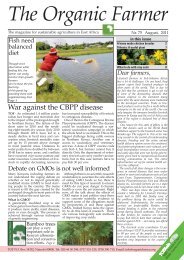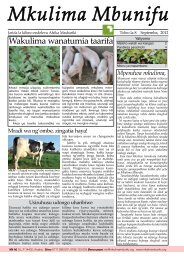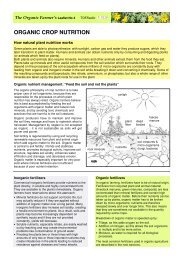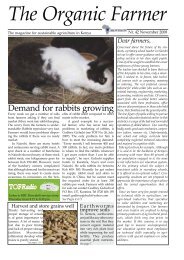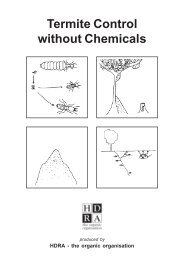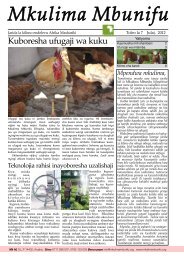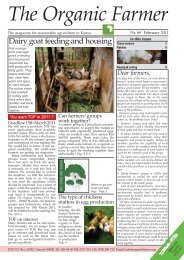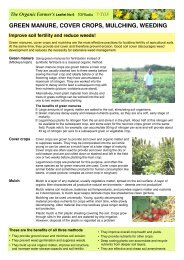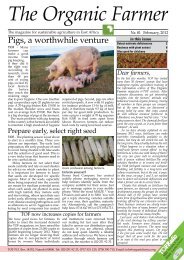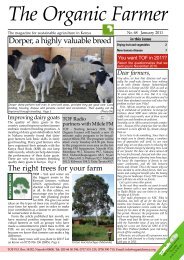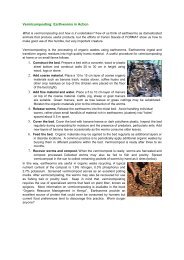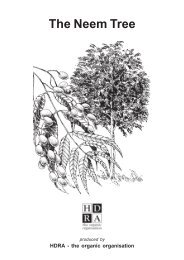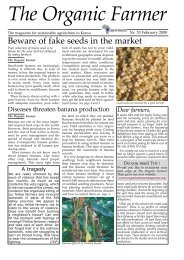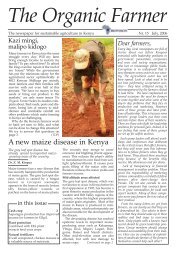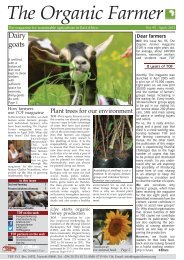TOF, Issue No 07, November 2005 - Infonet-Biovision
TOF, Issue No 07, November 2005 - Infonet-Biovision
TOF, Issue No 07, November 2005 - Infonet-Biovision
Create successful ePaper yourself
Turn your PDF publications into a flip-book with our unique Google optimized e-Paper software.
4 The Organic Farmer Nr. 7 <strong>No</strong>vember <strong>2005</strong><br />
Diversification changes farmer's fortune<br />
He took technical advice seriously<br />
and today he is one of the most<br />
successful farmers in Kisii district<br />
By Peter Kamau, Kisii<br />
For 36-year-old Ronald Nyagaka,<br />
farming in the hilly highlands of<br />
Kiogoro division of Kisii district had<br />
been a continuous nightmare of lossmaking<br />
ventures. Despite striving<br />
hard, crop yields in his three-acre<br />
farm dwindled while prices kept<br />
falling.<br />
He grew maize for successive years<br />
on a large portion of the farm, but<br />
the prices were discouraging. When<br />
he ventured into tomato farming,<br />
disaster struck. This was three years<br />
ago when his entire tomato crop was<br />
wiped out by a "strange disease".<br />
He heeded advice<br />
But unlike fellow villagers who<br />
would have explained it away as the<br />
work of an evil spell, Ronald sought<br />
advice from the local Ministry of<br />
Agriculture office in Kisii town, 6<br />
km away. It is then that he developed<br />
a working relationship with the<br />
agricultural extension personnel.<br />
Nyagaka is now a beneficiary of the<br />
second phase of the National<br />
Agriculture and Livestock Extension<br />
Programme (NALEP II), a project<br />
funded by the Swedish International<br />
Development Agency which is<br />
trying to revive agricultural<br />
extension services to Kenyan<br />
farmers.<br />
"We visited his farm and diagnosed<br />
the problem to be bacterial wilt. We<br />
advised him to practise crop rotation<br />
and diversification to check diseases<br />
and boost his earnings", says Atieno<br />
Achieng, the divisional agricultural<br />
extension officer.<br />
The hardworking father of four<br />
heeded the advice from the official<br />
and went to work immediately. The<br />
results were tremendous and now<br />
Feeding the fish<br />
(Photo <strong>TOF</strong>)<br />
Nyagaka tends the tomato crop at his farm in Chinch<br />
Nyagaka is the envy of many a farmer<br />
in the neighbourhood and afar.<br />
Many different crops<br />
His farm, perched on a steep hillside,<br />
now holds a healthy crop of bulb<br />
onions, sukumawiki (kale), tissue<br />
culture bananas, improved orangefresh<br />
sweet potatoes, passion fruits,<br />
traditional vegetables, avocadoes,<br />
sugarcane and many other crops at<br />
various stages of growth.<br />
On the lower slopes is a portion<br />
with 1000 well-tended tea bushes. An<br />
abandoned brick quarry at the river<br />
frontage, which has been a mosquito<br />
breeding ground, is now converted<br />
into a fish farm stocked with 1,665<br />
tilapia fingerlings. On the lower part<br />
of the tea plot are seven beehives,<br />
which provide honey for sale.<br />
Upgraded indigenous chicken<br />
To avoid the heavy capital<br />
investment in modern poultry<br />
keeping, Nyagaka has learned new<br />
skills of improving the quality of<br />
indigenous chickens. He has<br />
identified good layers and brooders<br />
in his indigenous stock that he is<br />
upgrading through crossbreeding and<br />
quality feeding with organic green<br />
material, cereals and chicken mash.<br />
The brooders are housed in earthen<br />
notches made in the family kitchen<br />
walls to keep them warm and safe<br />
from thieves and predators such as<br />
dogs and wild cats.<br />
Shrewd and hardworking<br />
Nyagaka is today one of the most<br />
successful farmers in the densely<br />
populated Chinche village. His<br />
success is primarily because of two<br />
reasons: First, he plants many<br />
different types of crops, such that<br />
when the price is not good for one<br />
product, he can sell the other.<br />
Secondly his farming is marketdriven.<br />
Through meticulous timing<br />
and knowledge of what the market<br />
(Photo <strong>TOF</strong>)<br />
needs, he produces fruits and<br />
vegetables when they are off-season<br />
(mainly through irrigation) and sell<br />
them at premium prices. These he<br />
sells in Kisii and surrounding towns<br />
when the demand is high.<br />
"From the sale of various farm<br />
products I make an average of Ksh<br />
200,000 every year. Farming can be<br />
so profitable but it needs<br />
commitment and hard work," he<br />
says. He has built a permanent house,<br />
a modern zero grazing shed for cattle,<br />
pays school fees and is supporting his<br />
extended family.<br />
Two years ago he joined a few<br />
neighbours in setting up the Chinche<br />
Self Help Group. The group with 32<br />
members to date started off as a<br />
merry-go round where each would<br />
contribute Ksh 50 monthly, money<br />
that would assist them pay school<br />
fees, settle medical bills or buy<br />
household items. It is now registered<br />
with the Department of Social<br />
Services. That is why it is recognised<br />
as a focus group by the Ministry of<br />
Agriculture under the NALEP II<br />
programme.<br />
A model for other farmers<br />
Members of the group are learning<br />
new farming methods from<br />
Nyagaka. Farmers from many parts<br />
of the district also visit the farm to<br />
learn from him.<br />
After reading the story on dairy<br />
goat keeping in the September issue<br />
of The Organic Farmer, the group<br />
plans to start a similar project.<br />
Through the NALEP II<br />
programme, the farmer's group<br />
receives training on a regular basis<br />
on new agricultural methods,<br />
exchange visits and field days. The<br />
project plans to transform the group<br />
into an interactive learning site<br />
where farmers from other parts of<br />
the district will be trained in<br />
sustainable agriculture.



